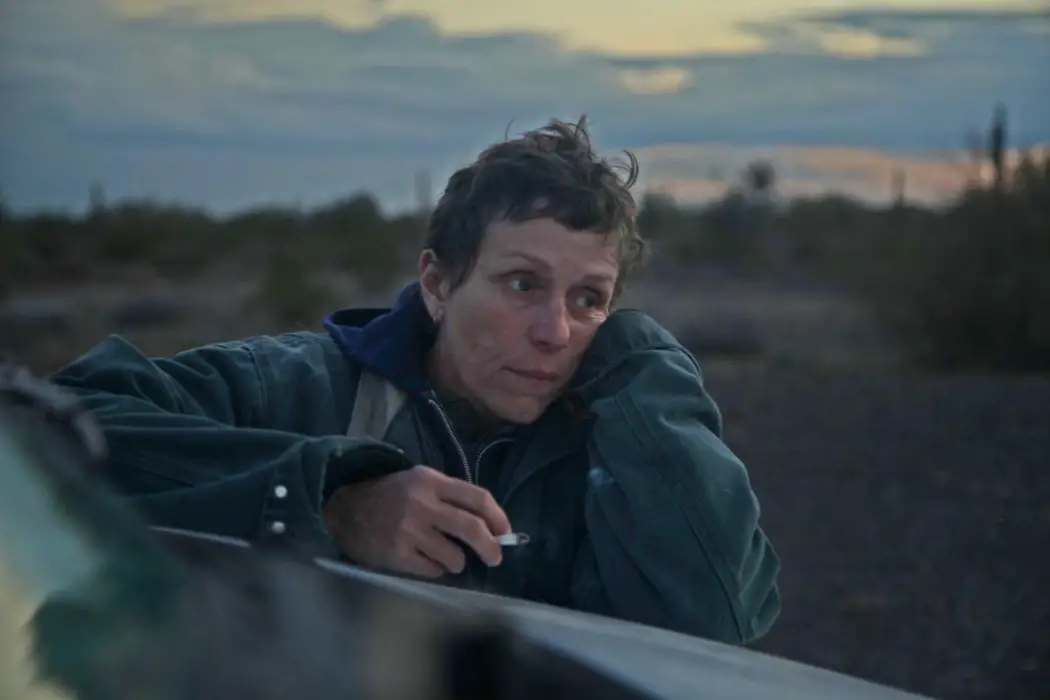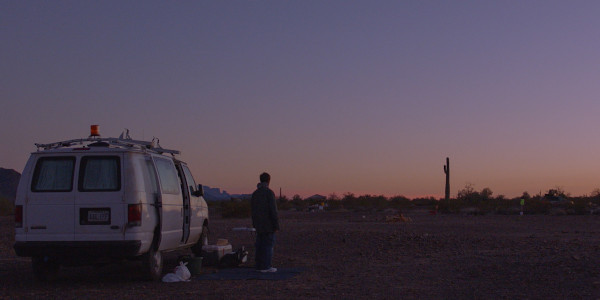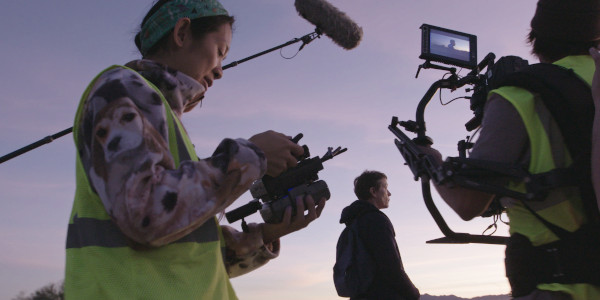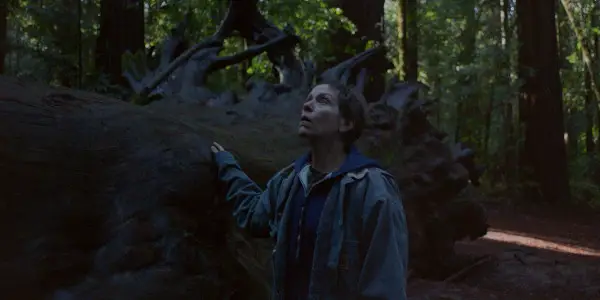Interview with Jessica Bruder, the Author Behind NOMADLAND

Luke Parker is an award-winning film critic and columnist based…
Journalist Jessica Bruder spent three years inside the belly of America’s economic beast for her 2017 book, Nomadland: Surviving America in the Twenty-First Century. Wheeling around inside were the nomads, a group of largely older Americans who traded in, for one financial reason or another, their roofs for vans. They’re not homeless, as Bruder explains, they’re just houseless.
Her work at the forefront of the Great Recession’s rippling effect soon inspired director Chloé Zhao (The Rider), who, with the starring prowess of Frances McDormand, converted Bruder‘s parables, observations and firsthand experiences into the award season heavyweight, Nomadland.
Film Inquiry recently spoke with Jessica Bruder about her book and the upcoming film. The writer touched on some of the causes of nomadic living, her impressions of the film, and her role in mediating the creative fusion of her nomad friends and the filmmakers.
This interview has been edited for clarity.
Luke Parker for Film Inquiry: The nomad lifestyle has been described as radical and outlandish, though you’ve said you want their story to serve as a wake-up call. Why is it important that we pay attention to this community?
Jessica Bruder: I think the community calls attention to the fact that, for a very long time, we’ve had flat wages; the federal minimum wage is still at $7.25 an hour in this country; housing costs are rising exponentially, and something’s gotta give. I think a lot of people on the road are using vehicular living as a way to hack the system, to maintain some semblance of the lifestyle they had in traditional housing, but in a mobile format.

I think more people are becoming aware of the issues surrounding income inequality, but I think nomad living is one that’s very visual that people are now paying attention to, particularly with the pandemic and the looming eviction threat.
Speaking of the pandemic, both your book and the film involve Amazon’s CamperForce program – seemingly very stressful and hard work. Last year saw Amazon double its net profit during the pandemic and create 175,000 new jobs. From your experience, what hardships probably faced CamperForce workers during COVID?
Jessica Bruder: I probably can’t speak to that because none of the people who were doing CamperForce when I was reporting on it are still doing it.
None of them?
Jessica Bruder: None of them, but the program is still there. Every year, they put out a map with all their factories, and there were many new places. So I’m guessing, unless the headcounts were really low, the program is continuing to expand. I stay in touch with those people, but they just aren’t doing it anymore. There’s a high rate of attrition for that job.
You threw yourself into the nomad community for years writing this story. But going back to when you first started learning about them – when these ideas and their motivations and philosophies were still fresh to you. One of these principles comes from Bob Wells, who suggests that the best way to find freedom is to become what mainstream society considers homeless. Peering in from the outside, what was your initial reaction to that idea?
Jessica Bruder: I initially wondered if that was a rationalization. I mean, in Bob‘s story, for example, he got divorced and couldn’t support two households. He was a clerk at Safeway, which used to be a strong union job. He was in Alaska and he ended up moving into a box truck and cried himself to sleep for a few nights until he actually really came to like it.
I think that for many people, it becomes very important to find agency despite all of the constraints of the society around you. For Bob, and for many others, it does feel like liberation from mortgage, rent, debt, utilities, just all of these chains that people are weighed down by in so-called “mainstream society.”
In a way, that was a naive first impression, and when I got closer, I realized it was more complicated than that. People could have coped with their circumstances quite differently, so I wouldn’t say that they’re in denial, I would just say it’s more complicated than it looks.

It’s funny. In the beginning, nobody says, “I was forced out.” When I met people, they would first talk about the adventure, they would talk about the freedom. And then, days or weeks later, I would hear about how everything was lost in the Great Recession, how the house went underwater, the medical debt, the credit card debt, the failed retirement plans. So that stuff would come out, but when I spoke to people, it wasn’t as if one of those things cancelled out the other. It was, “something happened, and then I chose this.”
In your book, you mention your presence as a journalist causing hesitation and discomfort in some of the nomads. From anyone you’ve spoken to or stayed in contact with, was there any hesitation about the idea of a movie?
Jessica Bruder: That’s a great question. I remember being a bit anxious about introducing all sorts of people in the book to the filmmakers. I loved The Rider by Chloe. I’m a fan of Francis‘ work, so extrapolating from that, I really thought they’d go in in a way that wasn’t exploitative and make great art. But it’s still anxiety producing when you’ve been reporting on a community for three years, you’re in touch with them, and they’ve come to mean quite a bit to you, to bring in some outside force.
But I think people were pretty welcoming. I think the people I introduced them to trusted me, so there’s a bit of a proxy thing going on.
It’s different having a book written than actually seeing something on the big screen about your life.
Jessica Bruder: Yeah, absolutely. I don’t know if it caused anxiety among individual people. My role was really reaching out to people and making the introductions, and people didn’t seem anxious about it.
When Chloe goes out, she’s very low-key. First time she was at Rubber Tramp Rendezvous, she had a car and a cookstove; the first time I was at Rubber Tramp Rendezvous, I had a car and a cookstove. I think we both had tents. So, I don’t think anybody had the feeling that Hollywood was coming crashing into their lives.
You’re in the peculiar position of writing a non-fiction book that has been turned into a semi-fiction film. Being far more entrenched in the truth and the reality of the story than most everyone who’ll be watching Nomadland, what elements of Fern’s story resonate as particularly truthful to you?
Jessica Bruder: Many of them. [laughs]
So, the idea of being houseless, rather than homeless was something I saw time and time again on the road. People really don’t want to be grouped under a word that has become so stigmatized that it actually’s become more of a stigma than a useful tool to describe a demographic.
Seeing rather than staying under a roof sometimes, she would go out and sleep in her van – I talked to numerous people who went home to visit their families and said they didn’t feel comfortable sleeping inside of a bed anymore, and that people were baffled that they preferred to go out in the driveway and sleep in the van.

So, lots of little, human details like that. The knock on the door, that was a particularly common experience. It’s one that I even got when I was what I call a “faux-mad,” when I was out there reporting in my van. Everybody’s terrified of being in a sound sleep or focused on something when you hear bang, bang, bang, and it’s a police officer or security guard telling you to move on. So when that happened, I was right there with her. I remember what that fear felt like.
You’re also in the much less peculiar position of having your book turned into a movie. As a writer watching the film – and I may be asking you to take a bite of humble pie here – were any parts of the story more effective on screen?
Jessica Bruder: I am happy to drink a whole gallon of humble pie, but it’s funny, I think it felt different. I loved being out in the West. I’m from the Northeast, so it really strikes me to be out there. It’s just massive and majestic and grand. I can describe those landscapes and describe the feelings that they provoke, but there’s something about seeing them onscreen that I think is miraculous – in a way that is probably hard to convey in a book.
I would’ve loved to go see the film in IMAX when it came out, but I’m doing the pandemic hideout, like a lot of people. Books and films can accomplish different things. Different media are suited to different story styles. I did the best I could with the book, and I love what they did with the film, so I just think I’m really lucky.
Film Inquiry thanks Jessica Bruder for her time.
Nomadland releases in theaters and on Hulu February 19. Nomadland: Surviving America in the Twenty-First Century is available wherever books are sold.
Does content like this matter to you?
Become a Member and support film journalism. Unlock access to all of Film Inquiry`s great articles. Join a community of like-minded readers who are passionate about cinema - get access to our private members Network, give back to independent filmmakers, and more.
Luke Parker is an award-winning film critic and columnist based in the Baltimore-Washington metropolitan area. As an entertainment journalist, he has interviewed several members of the film industry and participated in some of its most prestigious events as a member of the press. Currently, he is working to obtain his bachelor’s degree in Mass Communication at Towson University.












